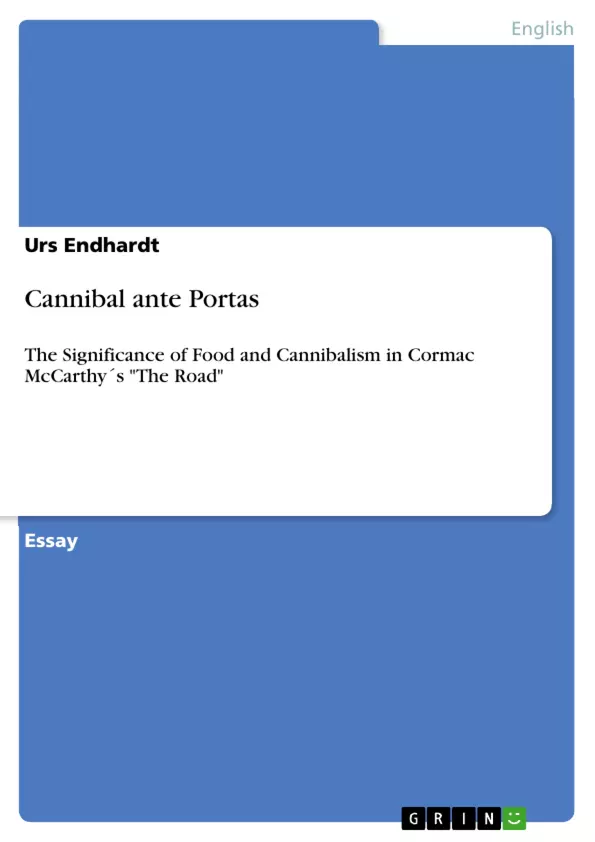The Road is set in an apocalyptic scenario in which most of humankind and the environ-ment seems to have been destroyed by an unspecified catastrophe. Still the few survivors, including the two main characters, have to eat something in order to stay alive. They nourish themselves from whatever edible they find on their way as they travel along a road in the hope of finding a warmer and more liveable place in the ruined country. But as the story develops they learn that not all survivors of the disaster are willing to live from the mostly insipid leftovers of the destroyed civilization but have instead developed an unholy desire for fresh human meat.
In this project work I would like to deal with the role of food in McCarthy’s novel and furthermore examine the parts that display cannibalism. Therefore I divide my project into two main parts of analysis.
Firstly I´m going to highlight how and for which reasons McCarthy uses the topic of normal food in his novel. Which stylistic devices does the author use to emphasize the role of food and how does McCarthy integrate the topic into the novel? And what role plays the absence of food?
Secondly I would like to focus on the cannibals. How are they described, what role do they play in the book and how is their appearance used by McCarthy to evoke fear and tension throughout the novel? In addition to that I´m trying to find out whether the author may have had any examples in mind when he conceived those bestialized creatures. Has he been influenced by other writers, real cannibalistic occurrences in extreme situations or within history? Where did his get his preference for violent topics from?
Inhaltsverzeichnis (Table of Contents)
- Introduction
- The role of food
- The role of cannibalism
- Conclusion
- Bibliographical reference
Zielsetzung und Themenschwerpunkte (Objectives and Key Themes)
This project work analyzes the role of food and cannibalism in Cormac McCarthy's novel "The Road". The objective is to explore how McCarthy uses these themes to portray the bleakness of the post-apocalyptic world and the struggle for survival. The project is divided into two main parts, focusing on the significance of food and the portrayal of cannibals.
- The scarcity and significance of food in a post-apocalyptic world
- The portrayal of cannibals as symbols of brutality and a descent into savagery
- The contrast between the deep paternal love of the man and the boy and the horrors of the world around them
- The themes of hope and despair in the face of a destroyed civilization
- The impact of the apocalypse on human behavior and the struggle for survival
Zusammenfassung der Kapitel (Chapter Summaries)
The introduction sets the stage for the novel's apocalyptic scenario and introduces the main characters, the man and the boy. It highlights the scarcity of food and the presence of cannibals as major elements of the story.
The chapter on the role of food explores how McCarthy uses the theme of food to portray the bleakness and hardship of the post-apocalyptic world. The scarcity of food, its ambiguous meaning, and its ability to both sustain and endanger the characters are discussed. The chapter also analyzes McCarthy's stylistic devices in depicting food and the impact of its absence.
Schlüsselwörter (Keywords)
The main keywords and focus topics of the text include post-apocalyptic world, survival, cannibalism, food scarcity, paternal love, hope, despair, human behavior, and the impact of the apocalypse on society.
Frequently Asked Questions
What is the central theme of McCarthy's novel "The Road"?
The novel explores survival, paternal love, and the loss of civilization in a bleak post-apocalyptic world.
Why is food such a critical element in the story?
Food represents the struggle for life; its scarcity highlights the desperation of the characters and the complete destruction of the environment.
How does the novel portray cannibalism?
Cannibalism is depicted as the ultimate descent into savagery and bestiality, serving to evoke fear and tension throughout the journey.
What stylistic devices does McCarthy use to emphasize food?
The project work analyzes how McCarthy integrates the presence and absence of food to contrast the characters' humanity with their environment.
What influenced McCarthy's depiction of cannibals?
The analysis explores whether McCarthy was influenced by historical cannibalistic occurrences, other writers, or extreme survival situations.
- Arbeit zitieren
- Urs Endhardt (Autor:in), 2010, Cannibal ante Portas, München, GRIN Verlag, https://www.grin.com/document/143163



